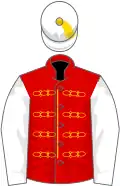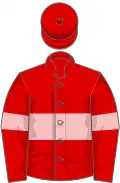National Stakes (Sandown Park)
The National Stakes is a Listed flat horse race in Great Britain open to horses aged two years old. It is run at Sandown Park over a distance of 5 furlongs and 10 yards (1,015 metres), and it is scheduled to take place each year at the end of May.
| Listed race | |
| Location | Sandown Park Esher, England |
|---|---|
| Inaugurated | 1889 |
| Race type | Flat / Thoroughbred |
| Sponsor | Matchbook |
| Website | Sandown Park |
| Race information | |
| Distance | 5f 10y (1,110m) |
| Surface | Turf |
| Track | Straight |
| Qualification | Two-year-olds |
| Weight | 9 st 3 lb Allowances 5 lb for fillies Penalties 5 lb for Group race winners 3 lb for Listed winners |
| Purse | £17,215 (2020) 1st: £10,360 |
| 2020 | ||
 |
 |
 |
| Ubettabelieveit | Wings Of A Dove | Mcmanaman |
| Previous years | ||
|---|---|---|
| 2019 | ||
 |
 |
 |
| Flippa The Strippa | Jm Jackson | Strive For Glory |
| 2018 | ||
 |
 |
 |
| Vintage Brut | Sabre | Konchek |
| 2017 | ||
 |
 |
 |
| Havana Grey | Frozen Angel | Haddaf |
| 2016 | ||
 |
 |
 |
| Global Applause | Mehmas | Bohemian Flame |
| 2015 | ||
 |
 |
 |
| King Of Rooks | Buratino | Steady Pace |
| 2014 | ||
 |
 |
 |
| Tiggy Wiggy | Cock Of The North | Roudee |
| 2013 | ||
 |
 |
 |
| Rizeena | Andhesontherun | Eastern Impact |
| 2012 | ||
 |
.svg.png.webp) |
 |
| Sir Prancealot | Top Boy | Effie B |
| 2011 | ||
 |
 |
 |
| Pyman's Theory | Bannock | Magic City |
| 2010-2001 | ||
|---|---|---|
| 2010 | ||
 |
 |
 |
| Dinkum Diamond | Chilworth Lad | Cape To Rio |
| 2009 | ||
 |
 |
 |
| Monsieur Chevalier | Star Rover | Raine's Cross |
| 2008 | ||
 |
 |
 |
| Icesolator | Finjaan | Foundation Room |
| 2007 | ||
 |
 |
 |
| Sweepstake | Lady Avenger | Al Muheer |
| 2006 | ||
 |
 |
 |
| Excellent Art | Cav Okay | Dress To Impress |
| 2005 | ||
 |
 |
 |
| Salut d'Amour | Northern Empire | Sunrise Safari |
| 2004 | ||
 |
 |
 |
| Polly Perkins | Moscow Music | Bunditten |
| 2003 | ||
 |
 |
 |
| Russian Valour | Incise | Under My Spell |
| 2002 | ||
 |
 |
 |
| Presto Vento | Arran Pilot | Silca Boo |
| 2001 | ||
 |
 |
 |
| Shiny | Maktavish | Triple Play |
| 2000-1991 | ||
|---|---|---|
| 2000 | ||
 |
 |
 |
| Taras Emperor | Stregone | Elsie Plunkett |
| 1999 | ||
 |
 |
 |
| Rowaasi | Fairy Gem | Nasaieb |
| 1998 | ||
 |
 |
 |
| Bint Allayl | Speedy James | Monkston Point |
| 1997 | ||
 |
 |
 |
| Pool Music | Banningham Blade | Nadwah |
| 1996 | ||
 |
 |
 |
| Deadly Dudley | Roman Imp | Daylight In Dubai |
| 1995 | ||
 |
 |
 |
| Amaretto Bay | Cayman Kai | Whicksey Perry |
| 1994 | ||
 |
 |
 |
| Signs | Prism | Subzero |
| 1993 | ||
 |
 |
 |
| Redoubtable | Risky | Fast Eddy |
| 1992 | ||
 |
 |
 |
| Lyric Fantasy | Hazy Kay | Ancestral Dancer |
| 1991 | ||
 |
 |
 |
| Marling | Miss Bluebird | Lady Of Mann |
| 1990-1988 | ||
|---|---|---|
| 1990 | ||
 |
 |
 |
| Balwa | Tinkins Wood | It's All Academic |
| 1989 | ||
 |
 |
 |
| Princess Taufan | Old Alliance | Petillante |
| 1988 | ||
 |
 |
 |
| Superpower | Shuttlecock Corner | Optaria |
The race was first run in 1889 and was known as the National Breeders' Produce Stakes until 1959. In 1932 it was "the most valuable two-year-old race on the English calendar".[1]
Previous winners include Pretty Polly (1903), Cicero (1904), Neil Gow (1909), The Tetrarch (1913), Tetratema (1919), Tiffin (1928), Myrobella (1932), Tudor Minstrel (1946) and Belle of All (1950).
Winners since 1975
| Year | Winner | Jockey | Trainer | Time |
|---|---|---|---|---|
| 1975 | Super Cavalier | Paul Cook | Gavin Hunter | |
| 1976 | Piney Ridge | Lester Piggott | Mick Kauntze | |
| 1977 | Noiritza | Pat Eddery | Mick O'Toole | |
| 1978 | Schweppeshire Lad | Greville Starkey | Michael Stoute | |
| 1979 | Rollahead | Joe Mercer | Jeremy Hindley | |
| 1980 | Penmarric | Greville Starkey | Gavin Hunter | |
| 1981 | no race | |||
| 1982 | Krayyan | Greville Starkey | Gavin Hunter | |
| 1983 | Precocious | Lester Piggott | Henry Cecil | |
| 1984 | Primo Dominie | John Reid | Brian Swift | |
| 1985 | Moonlight Lady | Pat Eddery | Paul Kelleway | 1:04.37 |
| 1986 | Risk Me | Pat Eddery | Paul Kelleway | 1:02.75 |
| 1987 | Tricky Note | Michael Hills | William Haggas | 1:01.18 |
| 1988 | Superpower | Tony Ives | Bill O'Gorman | 1:03.22 |
| 1989 | Princess Taufan | Ray Cochrane | Dr Jon Scargill | 1:00.47 |
| 1990 | Balwa | Willie Carson | Alex Scott | 1:02.15 |
| 1991 | Marling | Gary Carter | Geoff Wragg | 1:01.59 |
| 1992 | Lyric Fantasy | Michael Roberts | Richard Hannon Sr. | 0:59.62 |
| 1993 | Redoubtable | Richard Quinn | Richard Hannon Sr. | 1:00.95 |
| 1994 | Signs | Pat Eddery | Richard Hannon Sr. | 1:03.14 |
| 1995 | Amaretto Bay | Mick Kinane | Brian Meehan | 1:03.54 |
| 1996 | Deadly Dudley | Mick Kinane | Richard Hannon Sr. | 1:01.83 |
| 1997 | Pool Music | Richard Hughes | Richard Hannon Sr. | 1:00.72 |
| 1998 | Bint Allayl | Frankie Dettori | Mick Channon | 1:02.36 |
| 1999 | Rowaasi | Frankie Dettori | Mick Channon | 0:59.95 |
| 2000 | Taras Emperor | Jimmy Fortune | John Quinn | 1:05.89 |
| 2001 | Shiny | Philip Robinson | Clive Brittain | 1:02.72 |
| 2002 | Presto Vento | Dane O'Neill | Richard Hannon Sr. | 1:02.00 |
| 2003 | Russian Valour | Kevin Darley | Mark Johnston | 1:00.65 |
| 2004 | Polly Perkins | Kevin Darley | Nick Littmoden | 1:01.65 |
| 2005 | Salut d'Amour | Kieren Fallon | Jeremy Noseda | 1:02.33 |
| 2006 | Excellent Art | Frankie Dettori | Neville Callaghan | 1:06.49 |
| 2007 | Sweepstake | Richard Hughes | Richard Hannon Sr. | 1:02.72 |
| 2008 | Icesolator | Richard Hughes | Richard Hannon Sr. | 1:04.89 |
| 2009 | Monsieur Chevalier | Richard Hughes | Richard Hannon Sr. | 1:00.83 |
| 2010 | Dinkum Diamond | Dane O'Neill | Henry Candy | 1:01.88 |
| 2011 | Pyman's Theory | Richard Kingscote | Tom Dascombe | 1:02.55 |
| 2012 | Sir Prancealot | Richard Hughes | Richard Hannon Sr. | 1:01.85 |
| 2013 | Rizeena | Ryan Moore | Clive Brittain | 1:03.57 |
| 2014 | Tiggy Wiggy | Richard Hughes | Richard Hannon Jr. | 1:03.92 |
| 2015 | King Of Rooks | Richard Hughes | Richard Hannon Jr. | 1:01.30 |
| 2016 | Global Applause | Ryan Moore | Ed Dunlop | 1:01.17 |
| 2017 | Havana Grey | P. J. McDonald | Karl Burke | 0:59.93 |
| 2018 | Vintage Brut | David Allan | Tim Easterby | 1:02.50 |
| 2019 | Flippa The Strippa | Silvestre de Sousa | Charles Hills | 1:00.85 |
| 2020 | Ubettabelieveit | Oisin Murphy | Nigel Tinkler | 1:01.65 |
Earlier winners
- 1889: Rathbeal
- 1890: Tittle Tattle
- 1891: Lady Caroline
- 1892: Tibble Shiels
- 1893: Delphos
- 1894: Saintly
- 1895: Elmsworth
- 1896: Chelandry
- 1900: Star Shoot / Ian[lower-alpha 1]
- 1901: Game Chick
- 1902: Rabelais
- 1903: Pretty Polly
- 1904: Cicero
- 1905: Sarcelle
- 1906: Traquair
- 1907: White Eagle
- 1908: Bayardo
- 1909: Neil Gow
- 1910: Celllni
- 1911: Mountain Mint
- 1912: Prue
- 1913: The Tetrarch
- 1914: Redfern
- 1915–18: no race
- 1919: Tetratema
- 1920: Polly Flinders
- 1921: Polyhistor
- 1922: Town Guard
- 1923: Mumtaz Mahal
- 1924: Garden of Allah
- 1925: Kate Coventry
- 1926: Priscilla
- 1927: Flamingo
- 1928: Tiffin
- 1929: Queen of the Nore
- 1930: Thyestes
- 1931: Orwell
- 1932: Myrobella
- 1933: Colombo
- 1934: Bahram
- 1955: Wyndham
- 1956: Full Sail
- 1937: Portmarnock
- 1938: Rogerstone Castle
- 1939: Stardust
- 1940–45: no race
- 1946: Tudor Minstrel [lower-alpha 2]
- 1947: The Cobbler
- 1948: Abernant
- 1949: Palestine
- 1950: Belle of All
- 1951: Constantia
- 1952: Bebe Grande
- 1953: Tudor Honey
- 1954: Courageous
- 1955: Rustam
- 1956: Military Law
- 1957: Promulgation
- 1958: Captain Kidd
- 1959: Sing Sing
- 1960: Kerrabee
- 1961: Display
- 1962: Whistling Wind
- 1963: Pourparler
- 1964: Double Jump
- 1965: Zahedan
- 1966: Falcon
- 1967: Sovereign
- 1968: Tower Walk
- 1969: Quarryknowe
- 1970: Trasi Girl
- 1971: Stilvi
- 1972: Hunters Path
- 1973: Daring Boy [lower-alpha 3]
- 1974: Streak
- The 1900 race was a dead-heat and has joint winners
- The 1946 race was run at Ascot
- The 1973 race was run at Kempton Park
1948 Race Abernant v Star King
Abernant was the a dominant sprinter who went on to achieve champion status in 1949 and 1950. As a two-year-old in 1948 he was top of the Free Handicap. Abernant was only once on the stretch and that was in a fantastic race for the National Breeders Produce Stakes at Sandown on July 17th. His main opponent was Star King. The 1948 edition of The Bloodstock Breeders Review provided the following wonderful account written by James Park of the race.
"Star King had won three races in runaway fashion. He had not been engaged at Ascot... Star King's jockey Sam Wragg after a gallop said "Abernant may be a good one, but he will have to hop along". I should say there was something more than quiet confidence behind Star King. Each had earned the maximum penalty and were meeting at level weights.
When the tapes went up off went Star King. Abernant followed at an interval of perhaps three lengths. The others dribbled out of the gate, so that by the time half a furlong had been covered there were many lengths between Star King and the hindmost member of the party. The uphill course at Sandown is not one on which waiting tactics can be employed successfully. So I was rather surprised when Gordon Richards (Abernant's jockey) pretty well sat on Star King's tail without making any attempt to join issue. The leader was slipping along while still on the bit. Gordon, on Abernant, had what is known as a double handful. It was after covering three furlongs that Gordon set Abernant alight. He soon went past Star King and it looked all over bar the shouting. But drama was to follow. Star King had never even been shown the whip in previous races. It had not been necessary. It electrified him to such an extent he suddenly became jet propelled. By that time Abernant had gained probably a length lead. Quick to sense the situation, out came Gordon's whip. The response was not quite the same. Instead of gaining further ground, Abernant began to edge over to the right. Star King kept a perfectly true line. Up he crept, and 100 yards from the winning post he was still gaining. It was anybody's race as they went past the post, with Star King definitely going the stronger. The judge promptly ruled that Abernant had retained sufficient of his lead to win by the shortest of short heads. (There was no photo finish at Sandown at the time) James Park went on to write I am old enough to know better than to argue with the judge. He is the one person in a position to give an opinion. Sam Wragg thought he had won and he was not the only one.
Mr Wilfred Harvey, the owner of Star King, took it well. "I hope they can meet again over 6 furlongs" he said. They did not do so. The controversy raged throughout the season, and no doubt continued during the winter. There was the usual inquest. Noel Murless ... told me that in home gallops Abernant had been ridden from behind, and had always produced a brilliant burst of speed in the last 100 yards or so. That was why it was decided to adopt similar tactics at Sandown.[2]
In the Free Handicap at the end of the year Abernant was allocated 9st 7lb and Star King was second on the list at 9st 5lb. Timeform, in its first Annual that rated all horses, gave Abernant 133 and Star King 131 rating. [3]
References
- "AS GOOD AS TIFFIN?". Evening Post. 27 August 1932. Retrieved 2013-06-30.
- The Bloodstock Breeders Review 1948
- Timeform Annual 1948
- Paris-Turf:
- Racing Post:
- Ruff's Guide to the Turf 1987. Macdonald Queen Anne Press. 1987. p. 232-3.